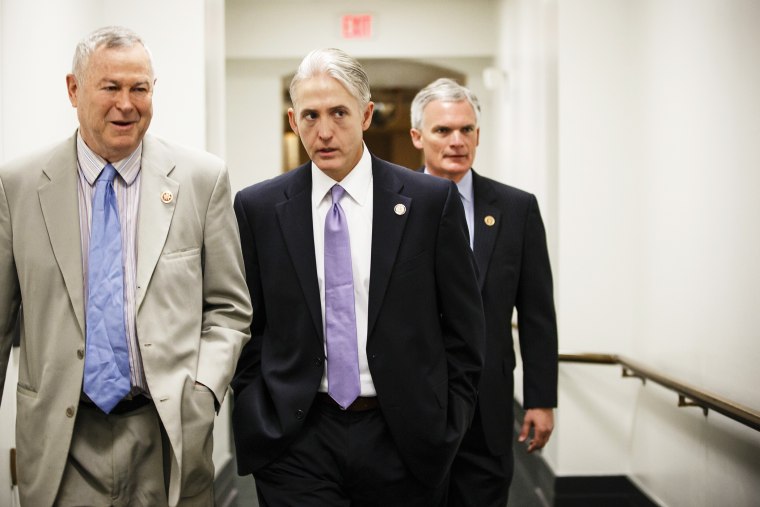Rep. Trey Gowdy (R-SC) has been tapped by Republican leaders to head up the House’s select committee on Benghazi. Gowdy took office in the GOP wave of 2010 after first defeating then-Rep. Bob Inglis (R-SC) in a primary. He quickly made a name for himself in the House Oversight Committee, where he aggressively questioned witnesses brought in to provide testimony on the Sept. 11, 2012 attack that killed four Americans, including Ambassador to Libya Chris Stevens.
Here are a few things to know about the man carrying the party standard on all things Benghazi.
1. He’s a prosecutor. Almost every profile of Gowdy begins by noting his work as a federal prosecutor and state district attorney, and Gowdy himself loves to speak in the language of the courtroom. In an appearance Wednesday on msnbc’s Morning Joe, Gowdy used a legal analogy to answer a question about whether his investigation might run into 2016, when Hillary Clinton, who was secretary of state at the time of the Benghazi attack, could be running for president.
“It would be shame on us if we intentionally dragged this out for political expediency,” Gowdy said. “On the other hand, if an administration is slow-walking document production, I can’t end a trial simply because the defense won’t cooperate.”
That answer rubbed some critics the wrong way, including The Washington Post’s Dana Milbank, who noted that Gowdy’s purported role was supposed to investigate the attacks to see if any wrongdoing was committed, not hold a “trial” of the White House. But Gowdy uses the trial metaphor often to emphasize his commitment to what he promises will be rigorous look at any evidence related to the attacks.
2. He’s popular on the right. Gowdy is almost universally respected among conservative politicians and commentators. Announcing Gowdy’s new role, Speaker John Boehner called him “as dogged, focused, and serious-minded as they come.”
His theatrical performances in hearings and public events have helped make him a rising star -- one video of him at a press conference last year went viral and garnered more than 2 million views on YouTube.
“I assume he’ll be a Supreme Court justice before he’s 65 or so,” fellow South Carolinian Sen. Tim Scott told National Review.
3. … less so with Democrats. The White House and Democratic lawmakers are not happy with Boehner’s decision to create a select committee, arguing it's an unnecessary partisan move unlikely to produce any new information after more than a year of previous investigations across multiple House and Senate committees. House Democrats are debating whether to boycott it.
Most of their criticism has been levied against GOP leaders' decision to create the committee itself, not Gowdy personally. Among liberal commentators, however, Gowdy has a reputation for playing to the base with made-for-TV antics and over-promising evidence of White House wrongdoing without providing backup.
“To call Gowdy prosecutorial would be an understatement,” The American Prospect’s Paul Waldman wrote. “Uniformly angry and outraged … Gowdy always seemingly on the verge of shouting, he's so damn mad.”
Gowdy has also been accused of mixing up his facts to go after his targets. Most recently, he expressed incredulity on msnbc as to why the White House would have an interest in preparing talking points after Sept. 11, 2012 about broad Middle East unrest, because “what else was being discussed after Sept. 11, 2012 other than Benghazi?" As msnbc’s Steve Benen pointed out, there were violent protests in other countries on the same day as the attacks, fueled by a YouTube video that some Muslims denounced as offensive.
4. But they shouldn’t underestimate him. Democrats might sneer at Gowdy, but he has earned his spot on the select committee for a reason. As Slate’s Dave Weigel notes, he has shown impressive empathy in hearings and has a penchant for asking strong leading questions that sometimes produce memorable answers. His supporters, like Sen. Lindsey Graham (R-SC) also think he’s smart enough to avoid the excesses that plagued conspiracy-minded Republican investigators under the last Democratic president, Bill Clinton.
Gowdy has taken at least some steps to try and insulate himself from accusations that his committee is largely a partisan exercise. He swore off fundraising related to the Benghazi investigation in strong terms, for example, telling msnbc that he “never sought to raise a single penny on the backs of four murdered Americans.”
Unfortunately for Gowdy, the rest of the party didn’t see it the same way. The National Republican Congressional Committee asked donors for cash with an online graphic that proclaimed “Benghazi was a cover up,” apparently prejudging the committee’s findings. They weren’t alone either – a variety of candidates and party committees invoked Benghazi in fundraising materials.
5. His hair is legendary. Political cartoonists are going to love Gowdy’s unkempt, multi-directional silver locks. BuzzFeed put together a list of the site's favorite Gowdy styles last year, declaring him the man with “the most confusing hair in Congress.”
